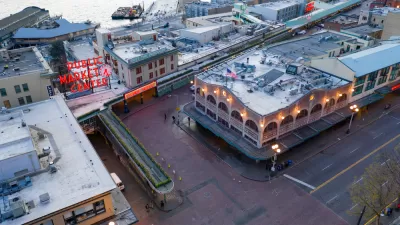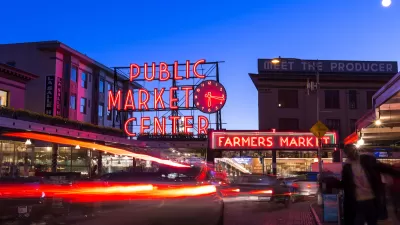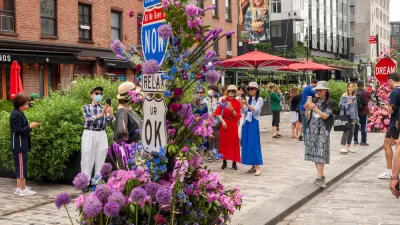It's been more than a century since the Seattle City Council decided to remove farmstands to make space for cars at the Pike Place Market. Public and political opinion is starting to see that decision as a mistake that can be reversed.

The Seattle Times Editorial Board has picked a side in one of the most heated urbanism debates to emerge from Seattle's pandemic experience: whether to block cars from accessing the streets in front of the Pike Place Market.
"City and Pike Place Market officials should make a priority of getting cars off the three blocks of Pike Place fronting the market, and the block of Pike Street that connects the market to the city," according to the editorial board.
A news article by David Kroman for The Seattle Times, published earlier in December, documents the growing public and political support for the change after the pandemic created an opening for a conversation about an idea that had previously been considered a political third rail.
Now The Seattle Times editorial board is willing to say what only the most ardent multi-modal advocates have been saying for years: it's probably not a good idea to allow cars and people to mix in one of the most visited corners of the city.
"If it was ever a good idea to allow motorists to drive through the crowds jostling along the brick street to browse market wares or stage selfies, that day has long passed. It shouldn’t take a heroic civic effort to block traffic from a minuscule fraction of downtown streets to benefit pedestrians who flock to the market by the millions each year," according to the editorial.
Any potential car-free future for the market is still a long way off, however. So far city officials with the power to expedite the car-free changes are only promising meetings—which could take a long time in a city famous for the 'Seattle Process,' which the editorial describes as "endless conversations and stalled progress."
FULL STORY: Let pedestrians enjoy Pike Place Market without cars

Alabama: Trump Terminates Settlements for Black Communities Harmed By Raw Sewage
Trump deemed the landmark civil rights agreement “illegal DEI and environmental justice policy.”

Planetizen Federal Action Tracker
A weekly monitor of how Trump’s orders and actions are impacting planners and planning in America.

The 120 Year Old Tiny Home Villages That Sheltered San Francisco’s Earthquake Refugees
More than a century ago, San Francisco mobilized to house thousands of residents displaced by the 1906 earthquake. Could their strategy offer a model for the present?

In Both Crashes and Crime, Public Transportation is Far Safer than Driving
Contrary to popular assumptions, public transportation has far lower crash and crime rates than automobile travel. For safer communities, improve and encourage transit travel.

Report: Zoning Reforms Should Complement Nashville’s Ambitious Transit Plan
Without reform, restrictive zoning codes will limit the impact of the city’s planned transit expansion and could exclude some of the residents who depend on transit the most.

Judge Orders Release of Frozen IRA, IIJA Funding
The decision is a victory for environmental groups who charged that freezing funds for critical infrastructure and disaster response programs caused “real and irreparable harm” to communities.
Urban Design for Planners 1: Software Tools
This six-course series explores essential urban design concepts using open source software and equips planners with the tools they need to participate fully in the urban design process.
Planning for Universal Design
Learn the tools for implementing Universal Design in planning regulations.
Clanton & Associates, Inc.
Jessamine County Fiscal Court
Institute for Housing and Urban Development Studies (IHS)
City of Grandview
Harvard GSD Executive Education
Toledo-Lucas County Plan Commissions
Salt Lake City
NYU Wagner Graduate School of Public Service





























